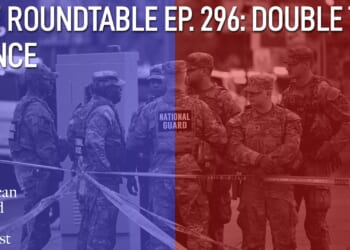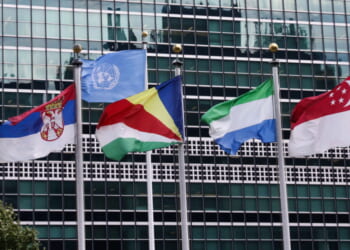Over 50 years ago, in October 1973, my unit received the news that my country was at war. The next 19 days were a trauma, as thousands of Israeli soldiers, some my friends and classmates, were killed or wounded. In the short term, their sacrifice in what became known as the Yom Kippur War would be wasted, as Israel soon returned the occupied Sinai Peninsula to its rightful Egyptian owners. More than that, though, countless Israelis since me have faced the fear and shock of battle, with no end to the slaughter in sight.
And though the last few weeks have shown hints of optimism — the hostages are home, and Gaza is free from the buzz of IDF drones — the Holy Land’s basic problems feel just as intractable. Whatever Donald Trump might claim, this truth can ultimately be encapsulated in his deal’s very last line. “The United States will establish a dialogue between Israel and the Palestinians,” the document proclaims, “to agree on a political horizon for peaceful and prosperous co-existence.” This, after all, has been the promise of peace negotiations since I was in the army — and so far they’ve achieved pretty much nothing.
We know, of course, that the current Israeli government, the most Right-wing coalition ever assembled in the nation’s history, has no intention of facilitating the creation of a Palestinian state. Long before he formed this government, in late 2022, Benjamin Netanyahu spent his entire career preventing that very possibility. As far back as his incitement against Prime Minister Yitzhak Rabin during the negotiation over the Oslo Accords — which led to Rabin’s assassination in 1995 — Netanyahu has been a vehement and consistent enemy of Palestinian statehood.
As recently as 6 October 2023, indeed, Netanyahu thought he could “manage the occupation” rather than putting an end to it through a political compromise. Hamas’s massacre the following day smashed that idea. But even if it hadn’t, Netanyahu’s colleagues would still have remained, with Itamar Ben-Gvir and Bezalel Smotrich both eager to dispossess the Palestinians and annex certainly the West Bank if not Gaza too. Either way, the triumvirate aspires to a very different future from that envisioned in the Trump plan Netanyahu has reluctantly endorsed.
If, as some fear, the Prime Minister ultimately manages to derail the plan, the demolition of Gaza and the slaughter of its Palestinian population will continue, even as some Jews hope to resettle the territory themselves. Those Palestinians remaining in Gaza will be squeezed into less than a quarter of the territory and subjected to conditions resembling a cross between a ghetto and a prison camp. This is all part of the openly professed government target of “encouraging” them to leave.
As for the West Bank, once conditions in Gaza require fewer Israeli troops, the illegal and plausibly apartheid regime in place there already will accelerate the ongoing ethnic cleansing of the territory, whose initial phases include moving the rural population into the urban centres in the south; taking over and demolishing the refugee camps in the north; separating both regions from each other; and progressively turning Palestinian communities into isolated outposts. Whether or not Israel succeeds in annexing parts of the West Bank, it aims to perpetuate a sense of poverty, siege, intimidation and despair intended to similarly “encourage” Palestinians in the West Bank to quit the territory altogether.
Many decades have passed since the start of Israel’s occupation in 1967, and its transformation into a nation ruling more or less equal numbers of Palestinians and Israelis. One of developments since has been the growing dehumanisation of Palestinians in the collective Jewish Israeli mind. The “social death” that Palestinians have undergone, insulated as they are behind the security barrier, means they’re encountered by Israelis only as a population to be controlled and oppressed. That becomes clear enough if you turn on the television, with one Channel 14 host claiming he doesn’t “sleep well” unless more of Gaza is flattened. Or else go on social media, with many comparing Palestinians to “Amalak”, a Biblical enemy that God commanded the Israelites to annihilate. As late as August, a Haaretz poll found that 82% of Israelis were untroubled by reports of famine in the Strip.
These societal attitudes are also reflected in law. Palestinian citizens of Israel still enjoy equal rights under Israeli law, with many pursuing successful careers from medicine to the law. Yet the Nation State Law, passed in 2018, defines Israel as the historical homeland of the Jewish people, and grants them the exclusive right to national self-determination in the country. At the core of this transformation is the gradual emergence of a thoroughgoing apartheid state, not only in the occupied territories, but increasingly in Israel proper as well. This is already manifested in the treatment of Palestinian citizens of Israel as an undesirable population that should similarly be “encouraged” to leave. As Haaretz again reports, over half of Israeli Jews now back expelling their Arab compatriots wholesale, up from 31% in 2003.
No less important, these hardening attitudes are now boomeranging back against Israeli Jews. The country’s beleaguered Attorney General and Supreme Court, seen before October 7 as the last bastions of the rule of law and civil rights for Jewish citizens, now remain silent in view of the widespread severe abuses of international law vis-à-vis Palestinians under occupation. More than that, they ignore or even condone the war crimes, crimes against humanity, and genocidal actions of the IDF in Gaza. Taken together, these institutions can no longer be expected to act in defence of Jewish citizens protesting their regime’s brutalities.
In other words, if Netanyahu scuttles Trump’s plan, using his own infamous bag of tricks, and relying on Trump’s notoriously short attention span, the future of Israel — quite apart from, but also related to, the catastrophic fate of Palestinians — is dire indeed. Even before the war, secular Israeli Jews feared that the growing demographic weight and political clout of their religious compatriots would change the nature of Israeli society. Since October 7, these fears, exacerbated by intensifying messianic rhetoric and the erosion of the rule of law, as well as the deteriorating economic situation, have led thousands of young professionals and their families to leave the country, with many more considering their own migration. Certainly, this exodus won’t be counterbalanced by the influx of Jews making Aliyah from the diaspora, notwithstanding the many examples of genuine antisemitism they face in Europe and elsewhere.
If this trajectory were to continue, in the coming decades Israeli society risks changing even in such strongholds of tolerance as Tel Aviv, with Israeli nationalism focused not only on its ethnic but also on its religious Jewish identity — one which rejects all other non-orthodox versions of Judaism. Religious coercion would greatly increase, and secular, progressive, and liberal Jewish life in Israel risk diminishing into ever-more isolated enclaves. Israel may not be the next Iran, but a mix of theocracy and authoritarianism may well be the destiny for a state largely founded by secular socialist Zionists who had rebelled against what they saw as the stranglehold of backward-looking religious leaders in the diaspora.
In foreign policy, too, Israel would suffer. If it were to become the apartheid state its critics have long accused it of being, it wouldn’t be able to maintain strong economic, political, and military ties with its main European allies and the United States. It would gradually lose the support of growing parts of the diaspora: even as things stand today, around two-in-three American Jews believe Israel has committed war crimes in Gaza. None of this is helped, of course, by the claim of Israel itself — a claim disputed by many Jews living beyond its borders — that it represents the Jewish people as a collective.
As an increasingly unstable and feeble pariah state, Israel could continue to exist for a couple of decades: mostly, perhaps, because it may still be perceived as a strategic asset by the United States. But the weaker it got, and the more extremist it became, the less of an asset Israel would be for any rational actor in the White House. All the while, keeping down millions of occupied Palestinians would only become harder, all of which would distract from Israel’s external security. In an unstable and violent region, that’ll only make it less attractive as a strategic ally to Europe or the US.
Taken together, this is not a country that I would want to live in, nor wish for my children and grandchildren to make a life in. It would also be the very opposite of what the visionaries of Zionism, the prophets of the Haskalah — the Jewish Enlightenment — or the Jewish religious sages throughout the generations, had hoped and prayed for.
In the long run, of course, the grim reality may lead Israelis to develop a more robust civil rights movement together with their Palestinian cousins, in a country which, combined with the occupied territories, now has a population of seven million Jews and seven million Palestinians. Optimists might even suggest that this will culminate in what was called for during the heyday of the Oslo negotiations: a “state of all its citizens”. But that is far from certain, considering how oppression and racism seems sure to generate ever more extremism: whether from Hamas or hill-top settlers. We may want to believe that, eventually, Israel will go through the same process as South Africa in the early Nineties. But there is no assurance that a Mandela or a de Klerk will emerge, and even if they do, current conditions in South Africa demonstrate that dismantling apartheid does not undo the long-term damage it inflicts on society.
This is why we must hope that the vague promises and hopes expressed in Trump’s plan do end up opening the path to another future. Despite the justified cynicism and scepticism expressed by its critics, and the obvious bad-faith of many of the politicians and advisers associated with it, the President’s plan broadly points in the right direction.
It’s clear, in the end, that the Gaza Strip must be ruled by its Palestinian population, and that it must be joined with the West Bank as a single political entity: the only way it can hope to be economically viable. Once the necessity of this process is recognised, it must also be acknowledged that the Jewish and Palestinian populations of this land have no choice but to find a way to share it with equality, justice, security, and dignity for all. The goal, then, is not to determine who has a greater right on the land, or who has committed worse atrocities, or who was there first — but to devise a plan that would allow both Jews and Palestinians to rule over themselves and to live side-by-side with members of the other group.
Such a blueprint actually exists, and the vague outlines of Trump’s plan do not in any way contradict it. That blueprint, known as “A Land for All”, and previously known as “Two States, One Homeland”, was founded under joint Israeli-Palestinian leadership in 2012. Now led by the Israeli Jew May Pundak, and the Palestinian citizen of Israel, Dr Rula Hardal, the movement has variously involved journalists, scholars and activists, both Israelis and Palestinians and on both sides of the Green Line.
Overall, the plan envisions a confederation between the States of Israel and Palestine, located more or less along the 1967 borders, and based on shared principles of equality, freedom and dignity. All the while, it would distinguish between citizenship and residence: so that Israeli citizens would be allowed to live in Palestine, and Palestinian citizens would be allowed to live in Israel, as long as they respected the laws of both states. Because the infrastructure of the land on both sides of the 1967 ceasefire Green Line is so inextricably linked — true from water, to electricity, to the “972” dialcode that unites Ramallan phones with their Haifan cousins — this confederation’s institutions would have to create mechanisms for sharing resources and institutions.
“The plan envisions a confederation between the States of Israel and Palestine”
In this Israel-Palestine Confederation, people would have their own national identity, and each state would enjoy the right of return for its group to be implemented as it sees fit within its own borders. But in the more distant future, the confederation, having shown that Jews and Palestinians can live productively, creatively, and safely side-by-side, may decide to transform itself into a single state of all its citizens — not through a violent struggle, but through a process of reconciliation, mutual respect and trust, and a recognition of the benefits of diversity and the creative power of fusing cultures and traditions, rather than striving to eradicate them.
Implementing this plan would require a radical change in Israeli political thinking and leadership — but also among Palestinians. Hamas is clearly no longer a plausible partner, if it ever was, meaning the only viable alternative is the Palestinian Authority based in Ramallah. But the PA is both deeply corrupt and discredited as a collaborator in the occupation. It hardly helps that, just like Hamas, the PA’s security forces have often been accused of torture, something which is incidentally also true of Israel itself.
But just as there are Jewish Israelis today who might yet be able to offer a different vision after decades of failure, so too can new Palestinian leaders emerge. Some potential leaders are currently in Israeli jails. Others are still unknown to us, or perhaps even to themselves. But once the political space for change is created, I believe that more pragmatic leaders will invariably emerge, as has happened more than once before when nations emerge from the darkness of colonialism and oppression.
If and when such a confederation is eventually created, it could become the very light to the Gentiles that some of the early and more humanistically inclined prophets of Zionism had hoped it would become. A city on a hill, not a pariah among the nations. And if you accuse me of utopianism, amid the slaughter in Gaza and the bubbling violence in the West Bank? Well, barely a century ago, the idea of a Jewish state in the Holy Land would have been dismissed as utopian too, and indeed was by Jews and non-Jews alike.
Yet as Theodor Herzl famously said, “if you will it, it will not remain a dream.” Besides, the status quo doesn’t need dreamers to condemn it: continue down this path and extremism will only grow. As for myself, I may not live long enough to see this different future, if it ever comes at all. But I pray that one day, my grandchildren, and the grandchildren of my Palestinian friends, will be able to experience the realisation of that promise — and finally consign the region’s endless wars to history.

















